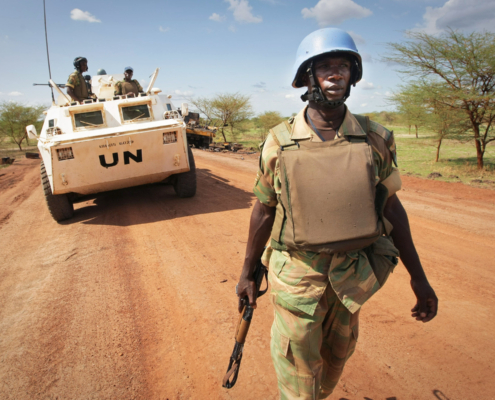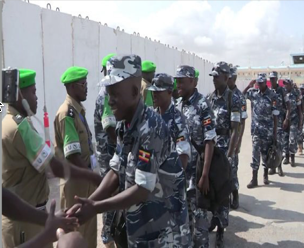Regional conflicts and peacekeeping
One of the objectives of the AU is to “promote peace, security, and stability on the continent”.[163] Among its principles is “Peaceful resolution of conflicts among Member States of the Union through such appropriate means as may be decided upon by the Assembly”.[164]
The primary body charged with implementing these objectives and principles is the Peace and Security Council. The PSC has the power, among other things, to authorise peace support missions, to impose sanctions in case of unconstitutional change of government, and to “take initiatives and action it deems appropriate” in response to potential or actual conflicts. The PSC is a decision-making body in its own right, and its decisions are binding on member states.
Article 4(h) of the Constitutive Act, repeated in article 4 of the Protocol to the Constitutive Act on the PSC, also recognises the right of the Union to intervene in member state in circumstances of war crimes, genocide and crimes against humanity. Any decision to intervene in a member state under article 4 of the Constitutive Act will be made by the Assembly on the recommendation of the PSC.
Since it first met in 2004, the PSC has been active in relation to the crises in Darfur, Comoros, Somalia, Democratic Republic of Congo, Burundi, Côte d’Ivoire and other countries. It has adopted resolutions creating the AU peacekeeping operations in Somalia and Darfur, and imposing sanctions against persons undermining peace and security (such as travel bans and asset freezes against the leaders of the rebellion in Comoros). The council is in the process of overseeing the establishment of a “standby force” to serve as a permanent African peacekeeping force.[citation needed] Institute for Security Studies, South Africa, March 2008.
The founding treaty of the AU also called for the establishment of the African Peace and Security Architecture (APSA), including the African Standby Force (ASF), which is to be deployed in emergencies. That means, in cases of genocide or other serious human-rights violations, an ASF mission can be launched even against the wishes of the government of the country concerned, as long as it is approved by the AU General Assembly. In the past AU peacekeeping missions, the concept was not yet applied, forces had to be mobilised from member states. The AU is planning on putting the concept into practise by 2015 at the earliest.[161][needs update]
Darfur, Sudan
Main article: African Union Mission in Sudan
South Sudanese independence referendum, 2011
In response to the ongoing Darfur conflict in Sudan, the AU has deployed 7,000 peacekeepers, many from Rwanda and Nigeria, to Darfur. While a donor’s conference in Addis Ababa in 2005 helped raise funds to sustain the peacekeepers through that year and into 2006, in July 2006 the AU said it would pull out at the end of September when its mandate expires.[165] Critics of the AU peacekeepers, including Dr. Eric Reeves, have said these forces are largely ineffective due to lack of funds, personnel, and expertise.
Monitoring an area roughly the size of France has made it even more difficult to sustain an effective mission. In June 2006, the United States Congress appropriated US$173 million for the AU force. Some, such as the Genocide Intervention Network, have called for UN or NATO intervention to augment and/or replace the AU peacekeepers. The UN has considered deploying a force, though it would not likely enter the country until at least October 2007.[166] The under-funded and badly equipped AU mission was set to expire on 31 December 2006 but was extended to 30 June 2007 and merged with the United Nations African Union Mission in Darfur in October 2007. In July 2009 the African Union ceased cooperation with the International Criminal Court, refusing to recognise the international arrest warrant it had issued against Sudan’s leader, Omar al-Bashir, who was indicted in 2008 for war crimes.[167]
The AU struggled to have a strategic role in the independence talks and the reconciliation process of South Sudan, due to overwhelming interests of African and non-African powers, its influence is still limited and not consistent.[168]
Somalia
Main article: African Union Mission to Somalia
From the early 1990s up until 2000, Somalia was without a functioning central government. A peace agreement aimed at ending the civil war that broke out following the collapse of the Siad Barre regime was signed in 2006 after many years of peace talks. However, the new government was almost immediately threatened by further violence. In February 2007, the African Union (AU) and European Union (EU) worked together to establish the African Union Mission in Somalia (AMISOM). The purpose of AMISOM was to create a foundation that would hopefully provide aid to some of Somalia’s most vulnerable and keep the peace in the region.
They are tasked with everything from protecting federal institutions to facilitating humanitarian relief operations. Much of the AU’s opposition comes from an Islamic extremist group named al-Shabaab.[169] To temporarily shore up the government’s military base, starting in March 2007, AU soldiers began arriving in Mogadishu as part of a peacekeeping force that was intended by the AU to eventually be 8,000 strong.[170] Eritrea recalled its ambassadors to the African Union on 20 November 2009[171] after the African Union called on the United Nations Security Council to impose sanctions on them due to their alleged support of Somali Islamists attempting to topple the Transitional Federal Government of Somalia, the internationally recognised government of Somalia which holds Somalia’s seat on the African Union.[172] On 22 December 2009, the United Nations Security Council passed UNSCR 1907, which imposed an arms embargo on Eritrea, travel bans on Eritrean leaders, and asset freezes on Eritrean officials. Eritrea strongly criticised the resolution. In January 2011, Eritrea reestablished their mission to the AU in Addis Ababa.[173]
In the fall of 2011, AMISOM forces, along with Kenyan and Ethiopian forces launched a set of offensive attacks on the al-Shabaab. In these attacks, AMISOM forces were able to reclaim key cities including the Somali capital of Mogadishu.
In September 2013, Ethan Bueno de Mesquita, a political scientist, argued that with the help of AMISOM forces, they had made it “nearly impossible for al-Shabaab to hold territory even in its former strongholds in southern Somalia”. Although much progress has been made towards peace in the region, it should still be noted that African Union forces’ still get attacked regularly. Despite AMISOM being effective, it is vastly underfunded and many forces lack the resources required. Funding for humanitarian relief and the formation of armies tends to be vastly undercut.[169]
Anjouan, Comoros
Main article: 2008 invasion of Anjouan
A successful 2008 invasion of Anjouan by AU and Comoros forces to stop self-declared president Mohamed Bacar, whose 2007 re-election was declared illegal.[174] Prior to the invasion, France helped transport Tanzanian troops but their position in the disagreement was questioned when a French police helicopter was suspected of attempting to sneak Bacar into French exile.[175]
The first wave of troops landed on Anjouan Bay on 25 March and soon took over the airfield in Ouani, ultimately aiming to locate and remove Bacar from office.[174] On the same day, the airport, capital, and second city were overrun and the presidential palace was deserted.[176] Bacar escaped and sought asylum in France. The Comoros government demanded his return, in order to determine his fate.[177] Many of Bacar’s main supporters were arrested by the end of March, including Caabi El-Yachroutu Mohamed and Ibrahim Halidi. Bacar’s asylum request was rejected on 15 May, as France agreed to cooperate with the Comoran government’s demand.[178] At the 29 June elections, Moussa Toybou won the presidency.[179]
See also
- 17th Ordinary African Union Summit
- African Century
- African Peer Review Mechanism
- African Renaissance
- African Unification Front
- Africanisation
- Arab Union
- Association of Caribbean States
- Caribbean Community
- Casablanca Group
- Central Asian Union
- Continental union
- East African Federation
- European Union
- Ezulwini agreement
- Friends of the African Union
- Indigenous peoples of Africa
- List of country groupings
- List of multilateral free-trade agreements
- Monrovia Group
- North American Union
- Organization of American States
- Pacific Union
- Union of South American Nations
- United States of Africa


